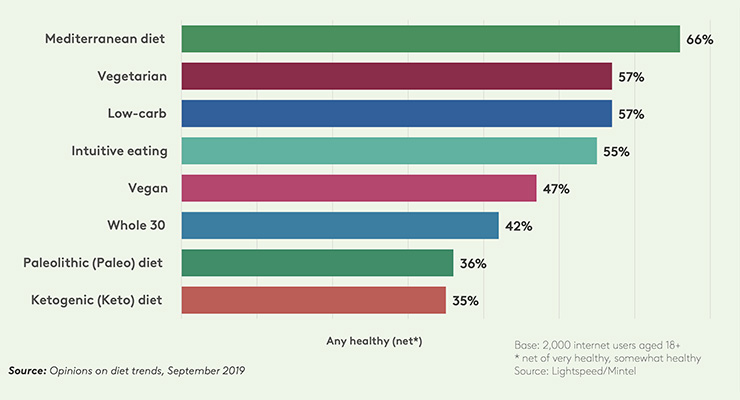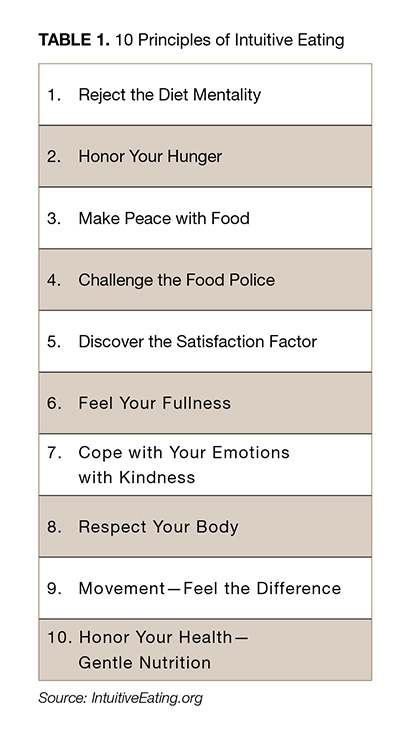Features
A Clearer Path to Weight Management: The Ozempic Factor
There are new tools for tackling the obesity epidemic, but still no magic solution.

By: Sean Moloughney
Editor, Nutraceuticals World

Americans have a complicated relationship with food.
More than 40% of U.S. adults and nearly 20% of children are obese, according to National Health and Nutrition Examination Survey data, increasing the risk for diabetes, heart disease, stroke, and certain types of cancer. The obesity epidemic also accounts for more than $170 billion in excess medical costs per year in the U.S., according to the Centers for Disease Control and Prevention (CDC).
There are many factors contributing to the heaviness of Americans, including: genetics; food insecurity; oversaturation of cheap, shelf-stable, high-calorie, low-nutrient processed foods; sedentary lifestyles; infrastructure that’s discouraged walking in many communities; scarcity of time for cooking and exercise; stress and sleep; and many more.
The weight equation is more complex than calories consumed vs. calories burned. Balancing diet, exercise/movement, stress management, proper sleep and other lifestyle matters is a heavy lift for many people.
Enter Semaglutide
For generations now, researchers and consumers have been searching for a silver bullet to shed pounds without harsh side effects. Candidates have come and gone, but today the talk of the town centers around two injectable drugs from Danish pharmaceutical company Novo Nordisk: Ozempic and Wegovy (semaglutide).In 2021, FDA approved Wegovy for chronic weight management in obese and overweight adults who have high blood pressure, type 2 diabetes, or high cholesterol. This marked the first obesity drug approved by FDA since 2014. The agency cleared the potent, once-weekly injectable drug for ages 12 and up in December 2022.
Ozempic is a lower-dose version of semaglutide that FDA approved for diabetes management in 2017. While it’s not approved for weight loss, the off-label use has become so popular—largely among people who can afford the expensive once-weekly injections—demand has outstripped supply.
As of May 2023, both Ozempic and Wegovy have been added to FDA’s Drug Shortages list.
According to FDA: “Semaglutide belongs to a class of medications known as glucagon-like peptide-1 (GLP-1) receptor agonists. It mimics the GLP-1 hormone that is released in the gastrointestinal tract in response to eating. One role of GLP-1 is to prompt the body to produce more insulin, which reduces blood glucose (sugar). GLP-1 in higher amounts also interacts with the parts of the brain that reduce appetite and signal a feeling of fullness.”
Despite their hype and popularity, Ozempic and Wegovy aren’t magic bullets. For one, injections are required indefinitely to maintain results, otherwise people regain weight. The most common side effects according to Norvo Nordisk include nausea, stomach pain, constipation, diarrhea, and vomiting. More severe side effects appear more common with the higher-dose Wegovy.
Given the high cost, which can be more than $1,000 per month in the U.S., and limited availability of these prescription drugs, they are not a cure-all for America’s weight problems.
The market for dietary supplements positioned for weight management is still stable. Overall, sales of weight management formulas dipped 1.7% to $184.4 million for the 52-week period ending Jul. 16, 2023, according to SPINS data.

Berberine Buzz
Meanwhile, social media has been buzzing about a plant-derived compound known as berberine, which can be extracted from goldenseal, European barberry, Oregon grape, phellodendron, and tree turmeric. Berberine is a bitter-tasting, yellow-colored chemical that has been used in dyes.TikTok in particular has been echoing claims that berberine is “nature’s Ozempic.” As viral videos picked up momentum this year, sales began to take off as well. From January to mid-July, berberine product sales reached approximately $4.5 million growing 88.8%, according to SPINS data.
Berberine is not natural Ozempic of course, and there isn’t much scientific evidence to support weight loss. However, some studies suggest the alkaloid may address metabolic issues by helping lower cholesterol and triglycerides and reducing blood sugar in certain populations.
Berberine has also been noted for its anti-microbial properties. A 2014 study published in Microbes (Wojtyczka, et. al) reported on a synergy between berberine and some antibiotics, demonstrating potential application of novel combinations for antibiotic-resistant bacterial infections.
Research has demonstrated some potential side effects and interactions, mostly with diabetes and blood pressure medications. It’s not considered safe for children or women who are pregnant or breastfeeding.
“The viral conversation surrounding pharmaceutical drugs for weight loss, such as Ozempic, has evolved into a discussion of more natural, herbal solutions to address various aspects of health including weight management,” said Ryan Sensenbrenner, senior marketing director at Enzymedica.
“Berberine has been used for centuries in traditional medicine, particularly in Chinese and Ayurvedic practices, and it’s important to note that the research on effects on weight management is still developing and more studies are needed to fully understand its mechanisms and benefits,” he added.
Berberine is believed to activate an enzyme called AMP-activated protein kinase (AMPK), which plays a role in cellular energy regulation and metabolism. “AMPK activation is associated with increased fat oxidation and improved insulin sensitivity,” Sensenbrenner noted.
Berberine may also have a positive impact on gut health by altering the composition of gut microbiota and improving gut barrier function, he added. “A healthy gut microbiome is increasingly recognized as having a key role in weight management.”
When choosing a berberine supplement, it’s important to pay attention to the type and source, according to Sensenbrenner. “Raw berberine is notoriously difficult for the body to absorb effectively and common side effects are diarrhea, nausea and other gastrointestinal issues.”
Enzymedica utilizes a proprietary form of berberine called Berbevis Berberine Phytosome, which applies phytosome technology to address these potential side effects, he said.

Rethinking Health & Weight
Aside from berberine, weight loss programs are still big business and products that promise to help shed pounds and inches are alluring. But there’s a shift in consumer thinking about health and nutrition overall.According to FMCG Gurus, when it comes to specific steps to improve health, consumers are more likely to say they have “attempted to improve their diet” (40%) than that they have “looked to lose weight” (35%).
“This shows that health is no longer associated with words and phrases such as diet and weight loss,” the company said. “Instead, health is associated directly with nutrition, as consumers not only look to avoid certain ingredients but to also absorb others.”
Worldwide, people are generally unsatisfied with their health and wellness; and weight is the area where consumers are least likely to be satisfied, with only 26% indicating some form of satisfaction, according to FMCG Gurus.
“In comparison, consumers are most likely to be satisfied with their bone and joint health (49%). However, the research shows that there is no area of health that most consumers are satisfied with. Given that consumers are adopting a concept of holistic health and believing that all aspects of health are interlinked, it shows that more attention than ever is being given to nutrition in diets.”
According to Mintel, 82% of adults are currently managing their weight in some capacity while 46% said they are focused on weight loss.
Wellness factors like avoiding health risks (53%), living longer (52%), and addressing health conditions (35%) motivating people to lose weight, Mintel noted.
“The movement towards holistic health and selfcare—fueled in part by the pandemic—has become part of the conversation surrounding weight management strategies,” noted Jennifer White Boehm, director of beauty, personal care, health and household reports at Mintel.
“It’s now imperative that industry players utilize a lifestyle approach for the greatest efficacy and sustainability. While emotional ‘feel good’ factors are important, weight managers still want to see quantifiable results. To that end, innovative focus on tech-based solutions to deliver personalized weight management will add value and cater to demands for community and accountability.”
Stress & Sleep Connections
Managing stress levels and getting quality sleep are two key ingredients in maintaining a healthy weight, according to Peyton Rudy, global marketing manager at dairy co-op Fonterra. “Their impact on weight is interconnected and can influence each other in many ways.”“Even by itself, stress can have a significant impact on weight management due to its effects on hormones, eating behaviors and metabolism,” she added. “When you experience stress, your body releases hormones like cortisol, which can lead to increased appetite, particularly for high-calorie and sugary foods. When stress is lower, people typically experience more control over their eating habits and eat more intuitively. Reducing stress means less potential for negative eating habits and an increased likelihood of regular physical activity.”
Sleep also plays a crucial role in regulating appetite, metabolism, and overall weight management, Rudy noted. “Lack of sleep, or poor quality sleep, can lead to hormonal imbalances that affect hunger and satiety hormones. When we are well rested, our energy levels rise and we are more likely to move and exercise, which are essential for weight maintenance. Similar to stress, lack of sleep can also affect decision-making and impulse control, making it harder to resist unhealthy food choices.”
Stress and sleep have a cyclical relationship; chronic stress can disrupt sleep patterns and lead to insomnia or poor-quality sleep. Conversely, inadequate or poor-quality sleep can increase stress levels and reduce the body’s ability to cope with stressors.
Consumers increasingly appear to grasp that the brain and body are interconnected, Rudy added. “Nutrition brands have moved beyond needing to convince consumers that nutrition for the brain and body are important, or that managing stress and sleep quality can have a major impact on maintaining weight. It is now about providing tailored solutions to the right consumers, which can mean combining physical, inner and mental wellbeing claims, even for weight management solutions.”
In early June, Fonterra’s brand Nutiani released new consumer data supporting the notion that consumers globally are highly aware of the interconnectedness of health; multifunctionality is also the top health claim they are looking for in products, according to the survey.
“From the research, we learned that nearly half of consumers believe mental wellbeing affects their ability to control their weight and exercise regularly,” said Rudy.
Demand for more holistic health solutions seems to parallel the emergence of “anti-dieting,” according to Nutiani’s whitepaper. “This movement strives to elevate holistic solutions, more specifically emphasize supporting the mind-body connection and ‘listening to your body’s cues’ to determine what, when, and how much to eat.”
Figure 1. “How healthy or unhealthy do you consider the following eating styles/specialized diet plans to be?”

Intuitive Eating
The term “intuitive eating,” a subset of anti-dieting, is gaining market recognition. The concept was first coined by two registered dietitians, Elyse Resch and Evelyn Tribole, in 1995.According to Tribole, “intuitive eating is a self-care eating framework, which integrates instinct, emotion, and rational thought … Intuitive eating is a weight-inclusive, evidence-based model with a validated assessment scale and over 100 studies to date.”
Intuitive eating relies on instinct, emotion, and rational thought to hone internal cues that guide eating habits and decisions. Resh and Tribole outlined 10 principles of intuitive eating (see Table 1).
More than half (51%) of U.S. consumers agree that counting calories is no longer necessary when following a healthy eating routine, according to survey data from Nutiani. “Intuitive eating is strongly favored in the court of public opinion and seen as a leading healthy diet trend. It measures close to Mediterranean, vegetarian, and low-carb diets, and far surpasses that of keto, paleo, and other more restrictive trends,” (see Figure 1).

Appearance & Social Pressure
Importantly, physical appearance and weight management are key indicators by which consumers measure their health. For example, FMCG Gurus consumer insights showed that in the UK, 69% of consumers think a healthy weight is important due to overall health and wellbeing, while 31% think it is important because of physical appearance.Findings also highlight that post-pandemic, consumers are evaluating their health based on day-to-day physical attributes and what they see in the mirror. During the pandemic, many consumers were measuring their health based on vulnerability to disease and illness, according to FMCG Gurus.
People want to feel more confident in their appearance (64%) and fit into their clothes (58%), per Mintel. This means weight loss has strong ties to self-esteem and confidence.
However, the influence of social media not only on diet and weight trends but also on how young people view themselves has come into clearer focus.
According to the Mayo Clinic, “A 2019 study of more than 6,500 12- to 15-year-olds in the U.S. found that those who spent more than three hours a day using social media might be at heightened risk for mental health problems. Another 2019 study of more than 12,000 13- to 16-year-olds in England found that using social media more than three times a day predicted poor mental health and wellbeing in teens.”
Additional studies have observed links between high levels of social media use and depression or anxiety symptoms, per the Mayo Clinic. “A 2016 study of more than 450 teens found that greater social media use, nighttime social media use, and emotional investment in social media—such as feeling upset when prevented from logging on—were each linked with worse sleep quality and higher levels of anxiety and depression.”
Meanwhile, STRIPED (Strategic Training Initiative for the Prevention of Eating Disorders), an organization associated with Harvard University, has for years sought to ban the sale of “over-the-counter diet pills” and “muscle supplements” to children.
In the past few years a wave of bills have been introduced to restrict access to certain weight loss and muscle building dietary supplements in states including New York, New Jersey, Rhode Island, California, Colorado, Missouri, Maryland, and Massachusetts. So far the only state to pass one of these bills is New York, where legislation is pending signature from Governor Kathy Hochul.
However, according to a review published in Nutrients this year authored by Susan Hewlings, dietary supplement use does not cause development of eating disorders. In fact, the vast majority of studies attempting to link supplements to eating disorders are poorly designed and conflate supplements with laxatives, illegal drugs, and other harmful products.
Hewlings’ review discussed the risk factors for clinically-diagnosable eating disorders that had the strongest statistical power. Psychological, genetic, biochemical, environmental, and socio-cultural factors outweighed all others, and more often than not, eating disorders manifest alongside other comorbidities such as depression, anxiety, and obsessive compulsive disorder.
According to the review, behaviors that have the most significant risk factor for disordered eating do not include the use of dietary supplements.
Instead, risky behaviors may include the use/abuse of laxatives and prescription diuretics, the use of nicotine, exercise fixation, self-induced vomiting after eating, the maintenance of unrealistic beauty standards, irrational and maladaptive beliefs about body fat, and harsh self-criticism.


